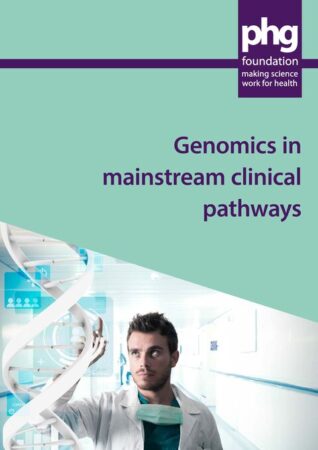Home Publications Reports Genomics in mainstream clinical pathways
Genomics in mainstream clinical pathways
Report from PHG Foundation led workshop on widening access to genomic medicine
The term ‘mainstreaming’ was first used in 2003 by the Secretary of State for Health in the context of the genetics white paper Our Inheritance, Our Future when he argued that genomics must move from the narrow confines of clinical genetics to applications available in every clinic and specialty across the health system from tertiary to primary care. Since then, the advance in technologies has proceeded at pace to now, where the cost and speed of sequencing and our understanding of the utility of testing makes this a distinct possibility.
However, to be clinically effective, truly equitable and efficient, mainstreaming requires an understanding of how and where genomic testing fits into current clinical pathways and how clinicians would use it.
PHG Foundation has identified two points within the evolving genomic medicine pathway critical to the fair and responsible delivery of genomics into the health system: choosing which patients will benefit from genomic testing and making the right referral, both of which remain a significant challenge.
PHG Foundation led a workshop in March 2017 to encourage dialogue between clinicians, clinical geneticists and the clinical genomic science community and clarify the changes essential to widening access to the benefits of genomic medicine.
What became clear from that discussion is:
- It is unlikely that mainstream clinicians will have the knowledge to select the appropriate test in any level of detail
- There are serious questions about how the process of capturing phenotypic information can be made more effective and efficient
- Vital to effective referral is obtaining detailed consent for testing, which requires both training and time
Read about the discussion and findings from the workshop in the report Genomics in mainstream clinical pathways

